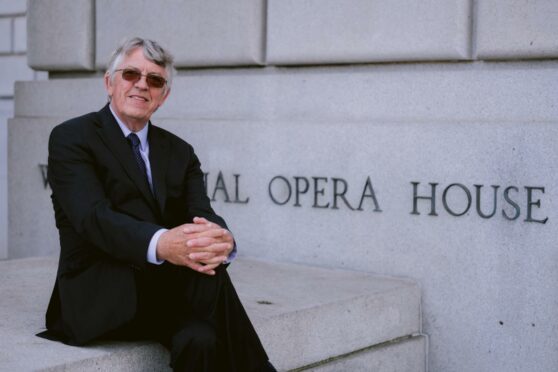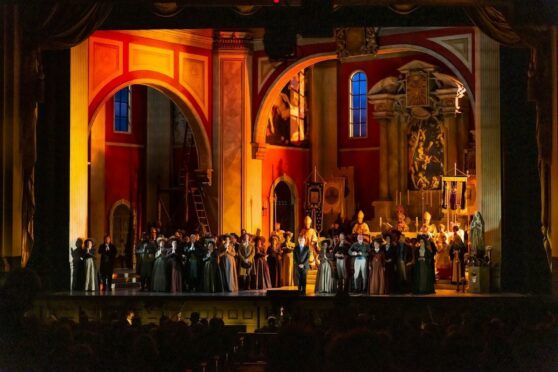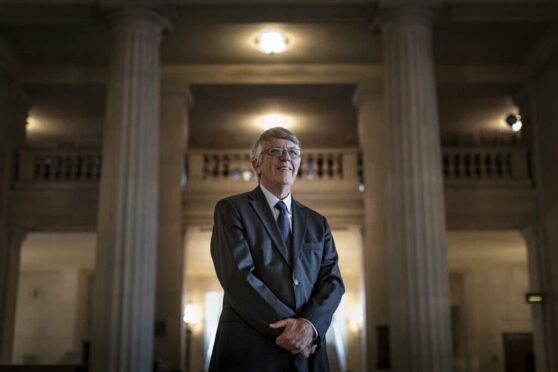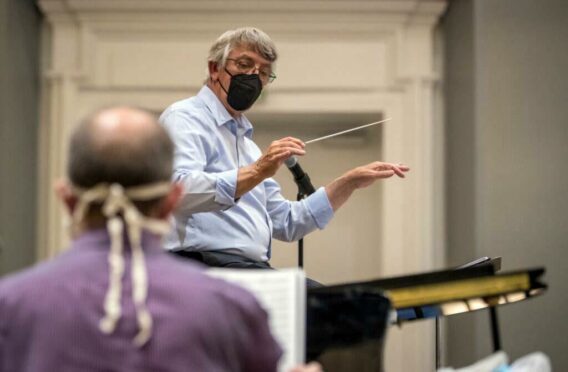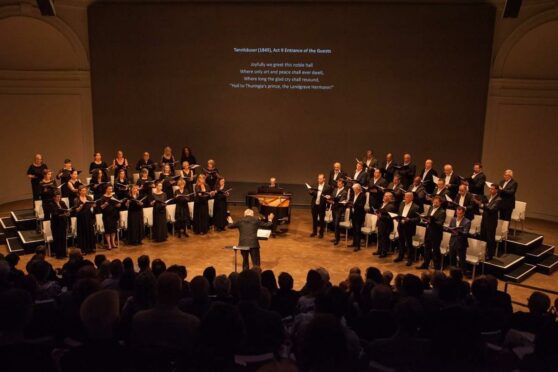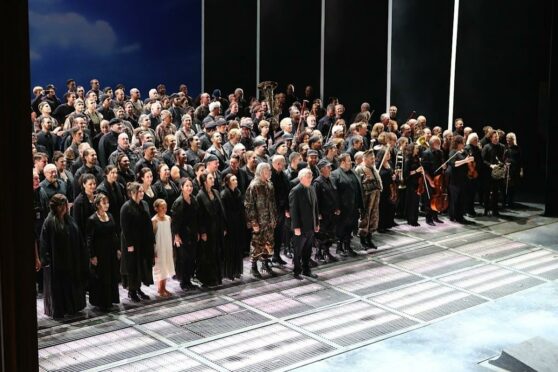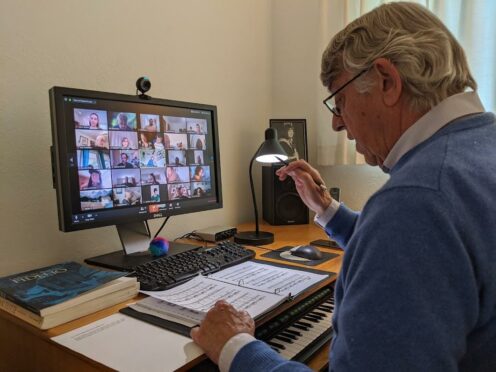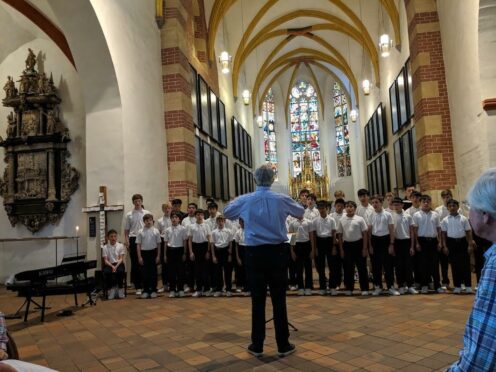Growing up in post-war Broughty Ferry, blossoming in the music department at Grove Academy and dreaming of taking on the “big city” of Glasgow someday, Ian Robertson certainly didn’t expect to end up in one of the most prestigious opera houses in the world.
Then again, he didn’t really plan for anything less.
“I have no idea what I would’ve done if I hadn’t done this,” admits Ian, who is now the outgoing San Francisco Opera Chorus director. “Music was always it.
“When I was about seven, I thought: ‘I want to do this’ and I never even thought about anything else.”
After spending his school years at Grove Academy tucked under the wings of the music department – “they helped me form my love for music” – Ian attended the Music Academy in Glasgow.
When he left college, he became assistant to Scottish Opera chorus master John Currie, before working his way up to chorus master himself.
From there, he was headhunted by Sir John Pritchard, then the musical director one of the “big three” opera companies in the Unites States – San Francisco Opera.
“One day, a phone call came through saying: ‘We’d like to offer you a job for a short contract’. It was nine months,” he explains.
“That was 1987! And lo and behold, me, my wife and my daughter have been here ever since.”
Now after almost 35 years at the helm of the San Francisco Opera Chorus, and 23 years as artistic director of the San Francisco Boys’ Chrous, Ian is retiring – but his passion for his life’s work hasn’t dimmed in the slightest.
“At San Francisco Opera, I’ve had the chance to work with world-class singers, conductors, directors, and it’s been just a great experience,” he beams.
“The excitement of being in an opera house with an international reputation! That was how I spent my life. That was my career. And I’ve been very happy to do it, very pleased indeed.”
‘People die, and people fall in love’
Ian’s enthusiasm is palpable – you can almost see the little boy who started out in Dundee all those years ago.
He was hooked on opera from the day his father, a liner type operator at DC Thomson, took him to see one at Broughty Ferry’s cinema when he was six years old.
An unusual passion for a Dundonian boy in those days perhaps, but Ian holds fast the firm belief that in spite of its somewhat stuffy reputation, opera is for everyone.
“Pretty much all over the world, people have tended to think that opera was for the elite,” he admits. “But my family weren’t opera-goers or anything like that. They were just Broughty Ferry residents struggling to make a living.
“Most of the stories the operas tell are very relevant,” Ian goes on, eyes lit up.
“People die, and people fall in love! And some go through bad things and some triumph! So the stories are perfectly listenable to anyone.
“And the music? Well, you don’t need to develop a taste for it, it just enhances in the drama, and makes people feel. It’s not pop music, but it’s very, very accessible.”
Opera ‘not just for folk with blue rinses’
He also explains that the culture of even big opera houses like San Francisco’s has changed, with audiences becoming younger and dress codes veering from buttoned-up to button-downs.
“In my experience at San Francisco Opera, in the 90s, for example, we were selling out 100% of the house – and it wasn’t just to people with blue rinses!” jokes Ian.
“When I first came here, on the opening night of the opera, the audience would all be in tuxes and long dresses – proper white tie.
“But nowadays, anything goes! Over the years it’s changed, and half the folk we see are in blue jeans and open-necked shirts.”
Although he has a twinkle in his eye reminiscing about the glitz and glamour of bygone opening nights – “all glitter and banquets and fancy dresses and fancy hats” – it’s clear Ian is more thrilled by the prospect of opera opening up to the everyman, particularly young people.
“I would encourage lots of young people to go to the opera house and see something, and don’t think of it like, ‘Oh, I’m going to the opera’,” he says. “You’re just going to a show.”
Language is no barrier for opera lovers
As for people who are put off seeing an opera because it’s sung in another language, Ian explains that opera is so much more than the words spoken, or sung.
“Opera is many disciplines – it’s lighting, it’s music, it’s costumes, it’s orchestra, it’s chorus.
“That’s one of the things you get with opera that you don’t get with other art forms, is to see all these disciplines coming together to provide an experience that you can only get at the opera house,” he says.
“Because it’s live, it’s not recorded like a movie. And to see it come together is one of the things that has thrilled me throughout the years.”
Ian himself has a grounding in most of the traditional languages, crediting “good old Grove Academy” with his basic German and French.
He picked up Russian and Italian along the way, through working with renowned musical directors Nicola Luisotti and Valery Gergiev but, surprisingly, never had formal training in either.
“I had to teach my chorus to sing in Russian,” he recalls.
“The conductor said: ‘Your chorus is very good but they pronounce Russian too well!’ Because these Russian choruses would sing kind of like – ‘wawl, wawl, wawl’ – these big, dark sounds. So it was kind of funny of him to say that.”
Nowadays, Ian tells me, the traditional Italian, French German and Russian operas stand alongside a rich and growing repertoire of Mexican, Chinese and English operas, some of which he has directed world premieres of in his time at San Francisco Opera.
“We actually even did an opera in Sanskrit, so we had to work really quite hard to work out how to pronounce the words,” laughs Ian, referring to the largely written nature of the ancient language. “But the sky’s the limit as far as we’re concerned.
“People with new ideas, new stories, artists from different parts of the world are integrating, music styles from all over the world are coming together. It really is a big, wide open space.”
‘He was the man who spoke to birds’
For Ian, it’s impossible to pick a favourite opera because, he explains: “When you’re working on one, it tends to be your favourite in that moment. Because you’re so committed to it.”
However, one standout memory for him is directing the chorus in San Francisco Opera’s production of Messiaen’s Saint Francois d’Assise, for which he was awarded the Olivier Messiaen Foundation Prize in 2003.
“It’s a five and a half hour opera,” Ian says fondly of the 1983 magnum opus by French composer Olivier Messiaen.
“And it was a production that was very colourful, and very true to the spirit of St Francis and his religious beliefs and his expression.
“Saint Francis was the man who spoke to the birds, and there were huge scenes where the chorus were all spread out in the shape of a bird’s wings.
“Then singers would sing way up in the galleries and create this evocative atmosphere, which was very special to me.”
Even to me, a lapsed Catholic who has never set foot in an opera house, it sounds magical.
‘You’ve got to believe in your own ideas’
Scrolling through Ian’s biography shows a carousel of awards, honours and titles all suggesting he is about as qualified and accomplished as anyone can be in his field.
But in keeping with his Dundonian roots, it is Ian’s humility which has proven to be his biggest asset professionally.
Don’t get it twisted – he doesn’t suffer from the so-called “Scottish Cringe”. In fact, he reckons that “to believe in yourself and go forward with your own ideas” is the bare minimum requirement for success.
The next step, he reveals, is “to be willing, and able, and determined to convince other people of what you want to do”.
But as a chorus director, he had to figure out the delicate balance between strong leadership and ruling with an iron fist – and he’s the first to admit he didn’t always get it right.
“I remember when I first came to San Francisco, I was maybe a little too dictatorial,” he admits.
“And then someone taught me that you get the best out of people if you approach them in a way that is collegial, rather than bumping your heads together. And lucky for me, I believed them.
“I learned you have to talk to people as if you’re taking them with you.”
His efforts to be a good leader have paid off, with many of his former San Francisco Boys’ Chorus students now pursuing music full time.
And it’s clear Ian couldn’t be prouder.
“I see them now, some of these kids who were 8 or 9 when I was working with them, with real spark and interest in the arts and music and singing, which were engendered by their time at the chorus,” he says.
“They know now that working in the arts and music is something to be proud of.”

